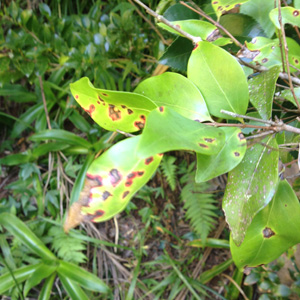In 2010-2011 a fungus, the Myrtle Rust (Uredo rangelii), made the headlines of not only trades magazines but also mainstream papers such as the Sydney Morning Herald.
The Myrtle Rust as its name indicates affects trees and shrubs in the Myrtaceae family. The Myrtaceae is a large family of plants and includes Australian natives like bottle brush (Callistemon sp.), tea tree (Melaleuca sp.), Eucalypt (Eucalyptus sp.), Lily Pilly (Syzygium and Acmena sp.), Uromyrtus and many more.
How this fungus entered Australia from South America is not known. Rust spores are easily transportable through various means making Rust diseases extremely difficult to eradicate.
At present, there is limited knowledge of the impacts and behaviour of myrtle rust under Australian conditions. The Nursery industry in particular has shown great diligence in making sure their plants would be disease free through sanitary control and breeding of rust resistant plants.
The Commonwealth, state agencies and the horticulture industry tried to control the spread of the disease but unfortunately the eradication effort was unsuccessful. The heads of Commonwealth and state agencies responsible for bio-security have taken the decision, based on expert technical advice, that it is now not technically feasible to eradicate myrtle rust from Australia. I recommend the careful reading of the Myrtle rust in natural ecosystems national workshop – Summary of outcomes which can be found at http://www.environment.gov.au/resource/myrtle-rust-natural-ecosystems-national-workshop-summary-outcomes
This is not a reason to stop planting members of the Myrtaceous family. In fact some Callistemon, Tristaniopsis, Waterhousia, Acmena, Syzygium and Xanthostemon amongst others are showing signs of high to medium resistance to this particular fungus.
As industry professionals our role is to understand what we can do to limit the spread of this Rust but also to draw lessons from this bio-security debacle.
In the years to come bio-security is going to be an important topic in Australia. Political expedients will affect the whole of the horticulture industry. Don’t you want to have our voice not only heard but more importantly listened to in this debate?
|
|
About Patrick Regnault
I have worked in the horticultural and landscaping industry for over 35 years in three different countries.I am a member and Registered Horticulturist with the Australian Institute of Horticulture and member of the Housing Industry Association. I am the owner of Interactive Landscapes, a successful structural landscaping and landscape design business. I believe that what gardens and gardening do is to reconnect people with the fundamental elements of nature. A good gardener will try and acquire a profound understanding of the balance of nature and endeavour to do the best to improve the environment in which the garden is situated. At Interactive Landscapes it is a philosophy that we put into practice when designing and creating a garden, no matter the size. Our name reflects this as we understand that gardens are a place of interaction. View all posts by this author » |










